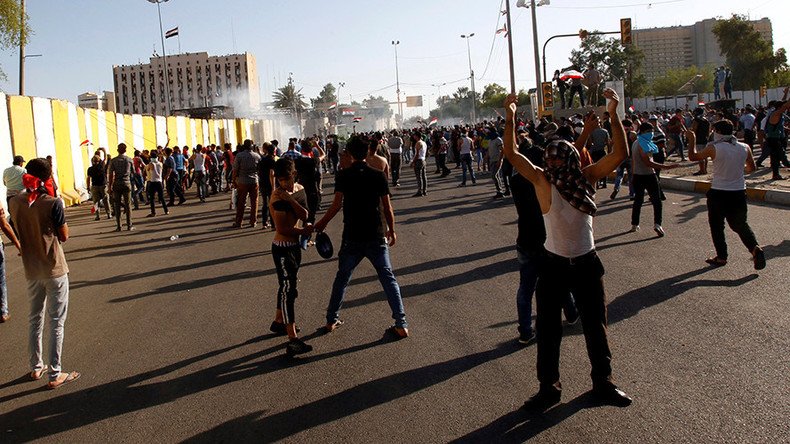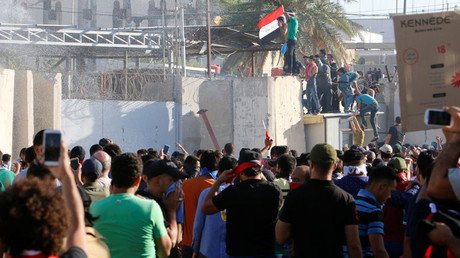‘Poorest of Iraq’s poor stormed Green Zone in Baghdad, where politicians live in palatial opulence’

People see how the politicians live so opulently. They have taken basically everything, while in fact the level of living has gone down tremendously for the poorest among the poor, former UN spokesperson for Iraq Said Arikat, told RT.
Hundreds of Iraq’s anti-government protesters stormed the so-called Green Zone in Baghdad on Friday. In response, security forces used tear gas and fired gunshots in the air. Supporters of the cleric Moqtada al-Sadr and many other demonstrators called for revolt. They are disappointed over the authority’s inability to approve anti-corruption reforms and ensure security in the country.
RT: What does it tell us about the security in Baghdad when the important government and diplomatic zone is stormed twice in less than a month?
Said Arikat: I can tell you that security in Baghdad has never really been good ever since the invasion of the US. It has gone, deteriorated a great deal, and there is a great deal of frustration. People see how these politicians live so opulently in former palaces. They have taken basically everything, while in fact the level of living has gone down tremendously for the poorest among the poor, which is the people that are inside the city, who have stormed this area twice this month.
So the security in Baghdad is not good. The government of Iraq has relied heavily on foreign companies and so on in the past. Now it is trying to empower its own security forces, but they really are not equipped to deal with that issue. But the overriding issue is: what do you do about this rampant corruption that has plagued the Iraq for more than a dozen years? That is the issue and only then would you bring the level of security to Iraq to where people can live a normal life.
RT: Iraq is at the forefront of the fight against ISIS, and the US top commander recently said the country's getting better at coping with this challenge. How much is the political instability affecting the war on terror?
SA: Look, the USA has committed itself to liberating Mosul, for instance, from ISIS by last spring. It’s been a year since then. The government of Iraq has not shown itself to be quite capable in dealing with ISIS. Certainly the militias have probably been proven more apt to fight ISIS as we have seen with al-Hash Al-Shabi and places like Tikrit and Romadi, where they played a tremendous role. But the US keeps pouring money, arms, and training into Iraq. But we haven’t seen the result yet. They need to take the more aggressive posture; they need to assert their own authority. To do this they have to have a national army – not an army that is predicated on sectarian fault lines, so to speak, and what we have in the past as a result of the dissolving of the Iraqi army.
I think that it is a daunting task for the Iraqi government to defeat ISIS as the US keeps proclaiming. They need to bring into its ranks all these different groups, and so on. But they also need to address the grievances of the public, because they need the support of the public. Those who stormed the Green Zone – it’s a place I am quite familiar with, because I lived there for so many years – those who stormed it…are poorest among the poor of the Shia population in Iraq. So they are supposedly on the side of the government. But as long as the government does not address the grievances the situation will be very difficult. It will have not only enemies among, let’s say the Sunnis, which have spawned this ISIS militia, but also among other militia groups. We all well remember when the Mahdi Army basically fought bloody battles with the government of former Prime Minister [Nouri] al-Maliki in 2007 and 2006, and so on. So this can come to haunt the Iraqi government and hinder its efforts to fight ISIS.
The statements, views and opinions expressed in this column are solely those of the author and do not necessarily represent those of RT.













